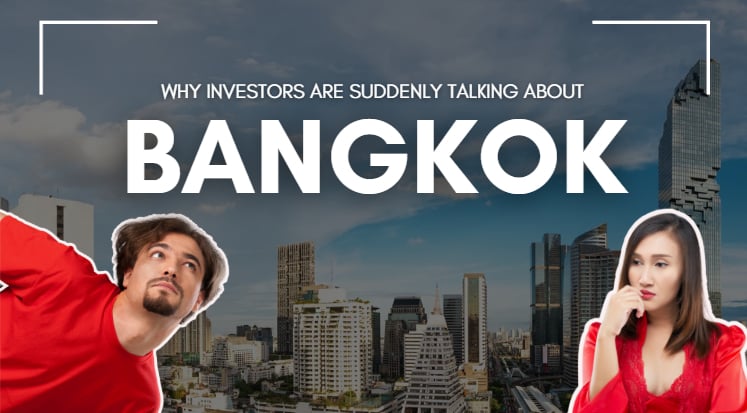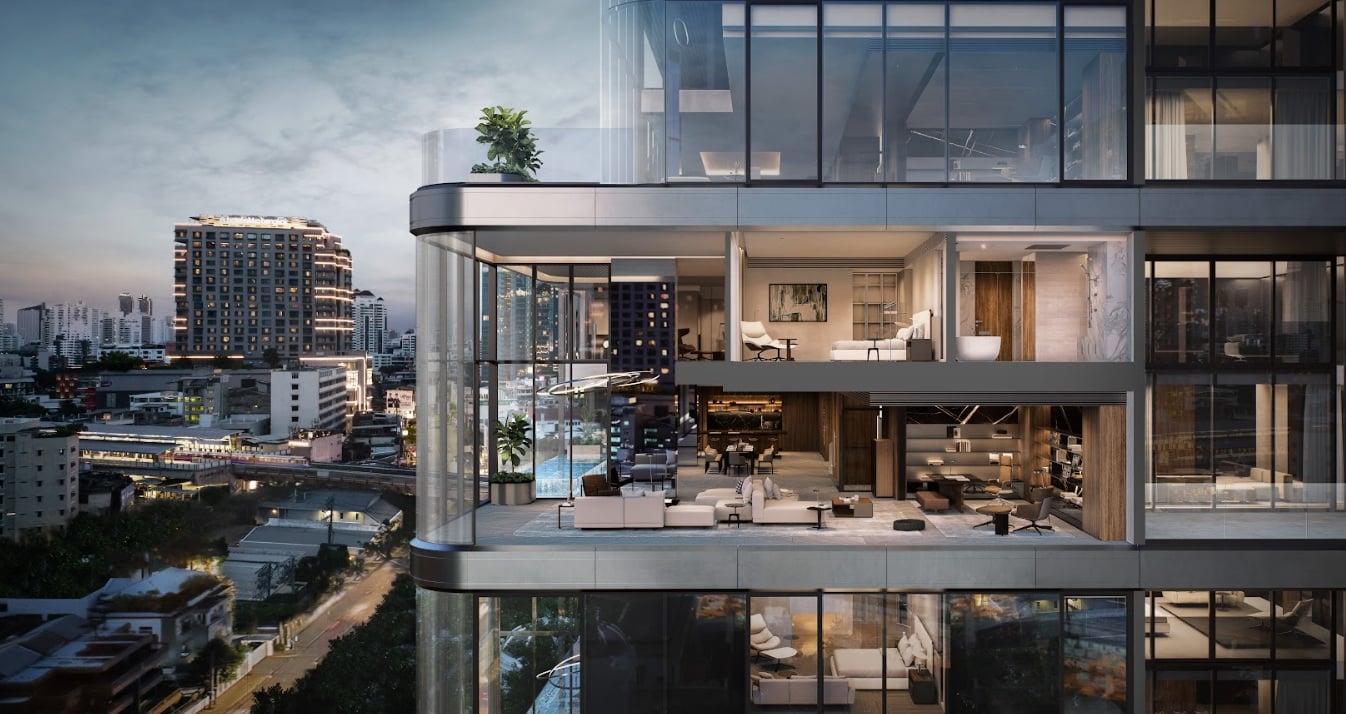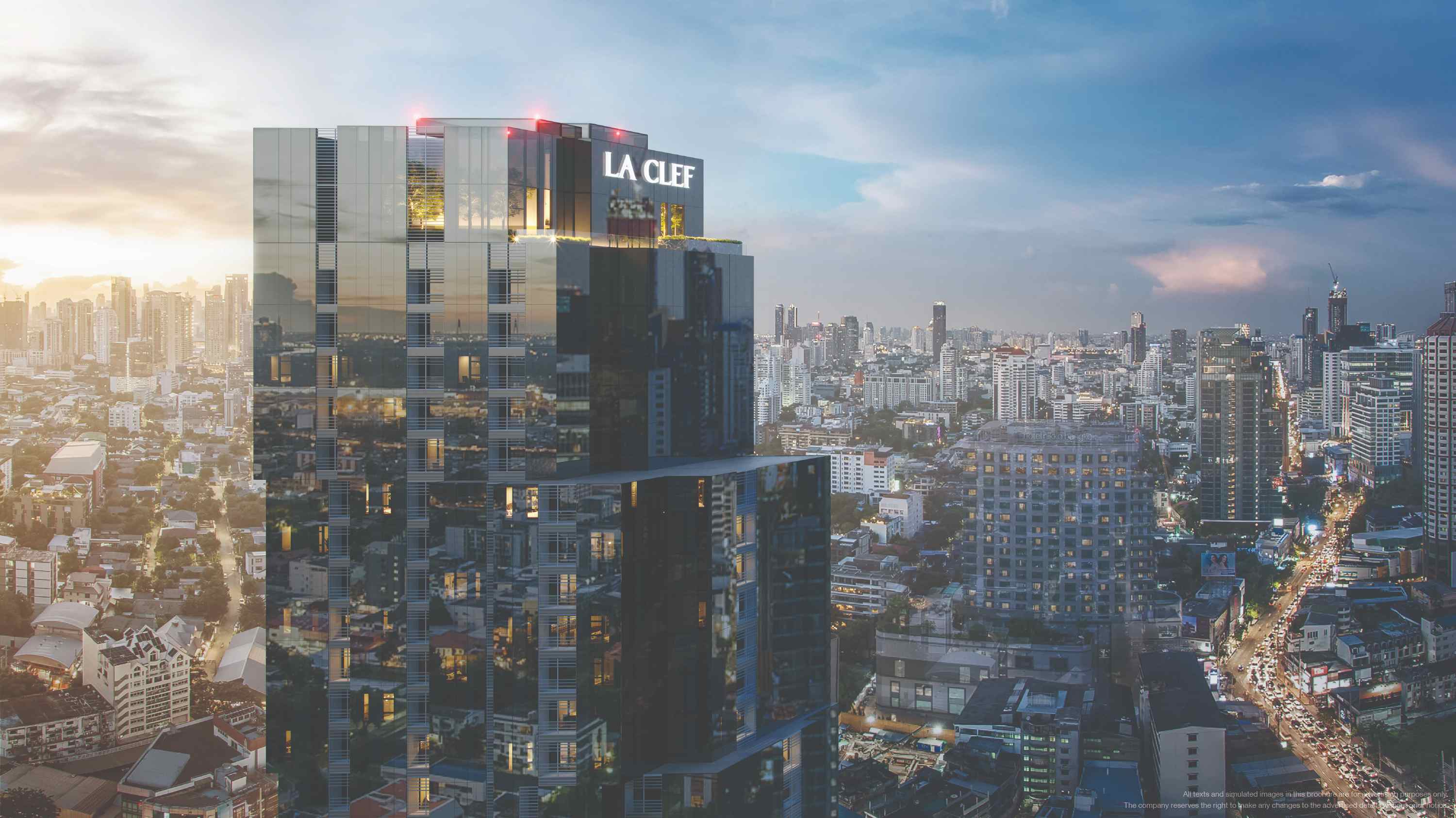|
Project |
Location |
Price (SGD) |
Buyer Appeal |
Yield Potential |
Investor Profile |
|---|---|---|---|---|---|
|
Porsche Design Tower |
Soi Sukhumvit 38, Bangkok |
S$20–50M for full duplex /penthouse |
Ultra-wealthy, brand-driven |
3-4% (capital appreciation play) |
HNWI's, trophy asset seekers |
|
La Clef Residences 38 |
Soi Sukhumvit 38, Bangkok |
S$850K–5M for 1–4 bedroom units |
Affluent expats, lifestyle investors |
4-6% |
Investors seeking balance of yield +lifestyle use |
Why Investors Are Suddenly Talking About Bangkok

We both know yields in Singapore are shrinking. Even in prime districts, you’re often looking at 2–3% net rental yield at best. Add in ABSD (Additional Buyer’s Stamp Duty), rising interest rates, and cooling measures — suddenly, that beautiful new launch condo looks more like a trophy asset than a serious investment.
That’s when the question creeps in: Should I look beyond Singapore’s shores?
And lately, one city keeps popping up in conversations with my clients: Bangkok.
Now, I know what you might be thinking. Isn’t Bangkok a “holiday” city? A place for cheap massages, spicy food, and weekend shopping trips? Sure. But here’s what many investors overlook:
Bangkok has been transforming quietly but powerfully over the last decade. It’s no longer just a tourist playground — it’s becoming a serious hub in Southeast Asia with:
- A rising affluent class – Thailand’s UHNW population is growing, and they want luxury assets.
- Regional connectivity – With new mass transit lines and infrastructure, areas once seen as “far” are now prime.
- Global luxury brands entering – Think Four Seasons Private Residences, Banyan Tree, and now the Porsche Design Tower. When global prestige brands enter a city, they don’t come for short-term plays. They come because long-term demand is real.
Bangkok is at that sweet spot where prices are still attractive, but prestige developments are pushing standards higher. The upside potential is much greater than what you’ll get in a fully matured, high-entry-price market like Singapore.
What’s Really Driving Bangkok’s Investment Momentum
The answer is simple: Bangkok has matured.
This isn’t the same Bangkok that was once only associated with budget condos and backpacker hostels. It has undergone massive transformation — and the results are beginning to show.
1. Infrastructure Boom – The Real Game Changer
If you’ve been visiting Bangkok regularly, you’ve seen the changes with your own eyes. A decade ago, traffic was the nightmare everyone talked about. Today, thanks to the BTS Skytrain extensions and MRT lines, the city has become more connected than ever.
- Bang Sue Grand Station: Southeast Asia’s largest railway hub, positioning Bangkok as a true gateway city.
- Eastern Economic Corridor (EEC): Infrastructure projects linking Bangkok to Pattaya and Laem Chabang port — massive implications for logistics, industry, and residential demand.
- Transit-oriented developments: Properties near new BTS and MRT stations are appreciating rapidly, just like we saw in Singapore when Circle Line or Downtown Line stations opened.
In Singapore, MRT-proximate condos are already priced into the millions. In Bangkok, you can still find luxury residences within walking distance to a BTS station for under S$1million. That’s the opportunity gap.
2. The Rise of Bangkok’s Affluent Class
Thailand’s economy has had its ups and downs, but one undeniable trend is the growth of its affluent and ultra-wealthy population.
- The number of Thai UHNWIs (Ultra High Net Worth Individuals) is growing at double-digit rates annually.
- These individuals are no longer satisfied with mid-market condos. They’re demanding branded residences, larger units, and developments with international prestige.
Developments that are built for long-term wealth holders — which tells you a lot about where Bangkok is heading.
3. Foreign Buyer Appeal
In Singapore, ABSD is punishing for foreigners. Buy one condo as a foreigner, and you’re hit with 60% ABSD. That’s a deal-breaker for many.
Bangkok, by contrast, has:
- No punitive foreign ownership taxes like Singapore’s ABSD.
- Freehold options available in many luxury projects.
- Entry prices at a fraction of Singapore’s prime market.
Example:
"A luxury 2-bedroom unit in Thonglor (prime expat area) can be secured at S$800k–1.2m. In Singapore’s equivalent prime districts, you’d be looking at S$3–5m easily."
For savvy investors, that difference is not just price — it’s portfolio diversification and yield strategy.
4. Rental Market – Lifestyle + Yield
Bangkok’s rental market has two powerful demand streams:
- Expat professionals and international businesses – Japanese, Koreans, Western expats working in Bangkok’s finance, tech, and industrial sectors.
- Short-term luxury rental market – Tourists and business travelers seeking branded residences or luxury serviced apartments.
Gross rental yields in Bangkok still hover around 4–6%, compared to 2–3% in Singapore prime. Yes, management and operational issues exist, but if you’re working with the right partner, these can be managed.
5. The Global Investor Psychology
Here’s the part most people don’t talk about.
In uncertain times — global job losses, equity volatility, geopolitical risks — wealthy investors think differently. They don’t just want stability. They want value plus growth.
That’s why Bangkok is now showing up on the radar alongside Melbourne, London, and Bali villas.
- Singapore = Safety and capital preservation.
- Bangkok = Growth and yield.
- Together? They balance each other.
And if you’re Singaporean, the strategy is simple:
Use Singapore as your “anchor asset” market. Use Bangkok (and Melbourne, Bali, etc.) as your growth + lifestyle play.
Even with mortgage sales creeping up in Singapore, the fundamentals here remain strong. But yields are modest. That’s the truth.
Bangkok offers something Singapore doesn’t:
- Higher yield potential.
- Lower entry price.
- Strong lifestyle appeal.
This doesn’t mean you abandon Singapore. It means you diversify smartly.
Spotlight on Bangkok’s Luxury Projects – Why These Matter
Now that we’ve talked about the why of Bangkok, let’s talk about the what. Because at the end of the day, you don’t invest in “trends” — you invest in properties.
And the truth is, Bangkok has two projects right now that I’d call game-changers:
1. Porsche Design Tower Bangkok
2. La Clef Residences 38
Let me break these down for you.
The New Benchmark: Porsche Design Tower Bangkok
When you hear “Porsche,” what comes to mind? Speed. Precision. Prestige. The kind of brand that doesn’t compromise.
Now, imagine that philosophy translated into property. That’s what Porsche Design Tower Bangkok represents — not just another luxury condo, but an ultra-prestige branded residence that sets a new benchmark for Asia.
Located in Bangkok’s financial heart, this project isn’t about affordability — it’s about exclusivity. The architecture carries Porsche’s DNA: sleek lines, cutting-edge design, and a lifestyle that caters to the ultra-high-net-worth crowd who want to own something no one else has.

Here’s why it matters to investors:
Global Branding Power – Buyers aren’t just purchasing a condo; they’re buying into the Porsche legacy. Branded residences consistently command premiums of 20–30% higher resale value than non-branded peers.
Target Market – This isn’t for everyone. It’s for the UHNWIs from Singapore, Hong Kong, China, the Middle East — people who buy one or two trophy assets in every global city.
Prestige Factor – Think about it. How many people in the world can say they live in a Porsche-designed home? Exclusivity drives value.
Price Advantage vs Singapore – Even at its premium positioning, you’re looking at PSF prices that are a fraction of what prime Singapore or Hong Kong commands. That gap alone makes it compelling.
If you’re chasing raw rental yields, this may not be your first pick. But if you’re aiming for capital appreciation + global prestige positioning, Porsche Design Tower Bangkok belongs in your portfolio.
It’s not a “need” property. It’s a “want” property. And those are the ones that hold value when the world shifts.
Boutique Elegance in Thonglor: La Clef Residences 38
If Porsche Design Tower is about adrenaline, power, and prestige, then La Clef Residences 38 is about something else entirely: timeless elegance, privacy, and lifestyle.
This project doesn’t scream for attention — and that’s exactly why it works. In a city where megaprojects dominate the skyline, La Clef 38 offers something rare: a boutique residence in one of Bangkok’s most coveted neighborhoods, Thonglor.

Why La Clef 38 Matters for Investors
Location, Location, Thonglor
- Thonglor is the beating heart of Bangkok’s expat and affluent local scene.
- Imagine Singapore’s Holland Village or Tokyo’s Daikanyama — trendy, international, buzzing with energy.
- Properties here are always in demand from Japanese, Korean, and Western expats, ensuring steady rental income.
The Boutique Factor
- In a market full of mega-condos with hundreds of units, boutique projects like La Clef 38 stand out.
- Limited supply = stronger long-term appreciation.
- Tenants and buyers alike value exclusivity, not mass living.
Price Sweet Spot
- Starting from THB 22,300,000 (approx. S$850,000)
- This is the “Goldilocks zone” for investors: not cheap mass-market condos (high competition, low margins), and not ultra-prime trophy assets (narrow buyer pool).
- It hits the sweet spot for affluent tenants and mid-level global investors who want both yield and lifestyle.
Rental Demand
- Japanese executives, in particular, form a core tenant base in Thonglor. Many companies provide housing budgets, often THB 70,000–100,000/month (SGD 2.6k–3.7k).
- Gross yields of 4–6% are realistic, which outpaces Singapore prime by almost double.
Why La Clef 38 Stands Out
- Sustainability of Demand: Expats and wealthy Thais will always want Thonglor. It’s not a “trendy” area — it’s a lifestyle hub.
- Exit Strategy: Smaller, boutique projects hold resale appeal because buyers know supply is limited. Unlike mass condos, you’re not competing against 500 identical units.
- Portfolio Balance: For Singaporean investors already stretched by ABSD, La Clef 38 offers a low-entry-price way to diversify abroad without overcommitting.
Porsche Design Tower vs La Clef Residences 38
Singapore + Bangkok: A Smarter Play Than Choosing One
Singapore is still one of the safest havens in the world. Limited land, transparent laws, AAA stability. That will never change.
But relying on Singapore alone? That’s like putting all your money in fixed deposits while inflation eats you alive.
Bangkok offers the other side of the coin:
- Higher yields.
- Lower entry costs.
- Strong lifestyle appeal.
- And still, long-term growth potential.
Together, they balance each other beautifully.
Singapore = Anchor. Stability, liquidity, prestige.
Bangkok = Growth. Yield, affordability, lifestyle.
I’ve seen this story before.
- Singapore in the 80s.
- Melbourne in the early 2000s.
- Bali in the last 5 years.
Early movers who diversified into those markets are sitting on massive gains today.
Bangkok is giving you that window right now.
Will it be a 5-year play? No. Real estate rarely is. But in 10 years? You’ll look back and either say: “I’m glad I took action.” Or “I wish I had.”
Opportunities like this don’t stay “hidden” forever. Once the crowd realizes it, the best units are already gone.
Reach out to me today!